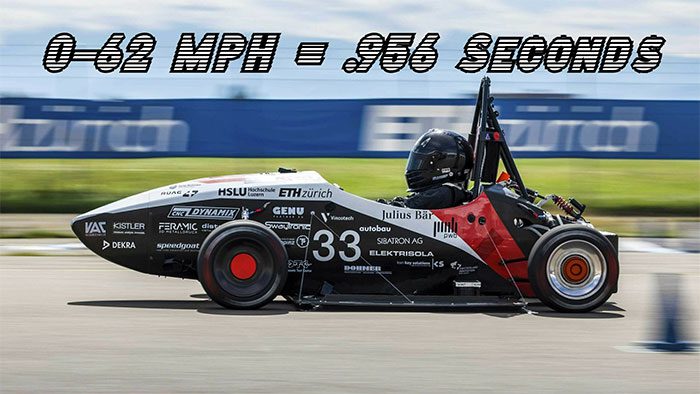The electric racing car from ETH Zurich accelerates from 0 to 100 km/h in just 0.956 seconds over a distance of 12.3 meters.
The record-setting process with the mythen model. (Video: ETH Zurich)
Students from ETH Zurich and the Lucerne University of Applied Sciences and Arts have broken the previous world record for the fastest acceleration with their self-built electric race car named mythen, as reported by ETH Zurich on September 12. Throughout most of the year, members of the Zurich Motorsport Club (AMZ) dedicated every spare minute to develop the mythen electric vehicle, overcoming obstacles and continuously revising the design of various components. The Guinness World Records has now confirmed that mythen has surpassed the previous record for the fastest acceleration for electric vehicles.
At the Swiss Innovation Park in Dübendorf, the racing car accelerated from 0 to 100 km/h in 0.956 seconds, achieving this new record over a distance of just 12.3 meters. This figure is more than one-third faster than the previous record set in September 2022 by a team from the University of Stuttgart (1.461 seconds). According to Yann Bernard, the team leader at AMZ, they collaborate with other students to continuously create new solutions and apply what they have learned in class.

The racing car accelerates from 0 to 100 km/h in 0.956 seconds.
All components of mythen, from the printed circuit board (PCB) to the chassis and battery pack, were developed and optimized by the student team. Thanks to the use of a super-lightweight honeycomb structure made of carbon and aluminum, the racing car weighs only about 140 kg. The central motor and special drive system provide the vehicle with an impressive power output of 240 kW, or approximately 326 horsepower.
“However, power is not the only important factor when setting an acceleration record. Effectively transferring that power to the ground is equally crucial,” says Dario Messerli, head of aerodynamics at AMZ. Formula 1 cars typically address this issue through aerodynamics, where the rear or front wing generates downforce. However, such effects only come into play once the vehicle reaches a certain speed. To ensure strong grip right from the start, the AMZ team developed a vacuum system to press the vehicle down onto the ground.
The AMZ student team previously set the world record for the fastest acceleration for electric vehicles twice in 2014 and 2016. In the following years, their record was broken by the team from the University of Stuttgart.




















































